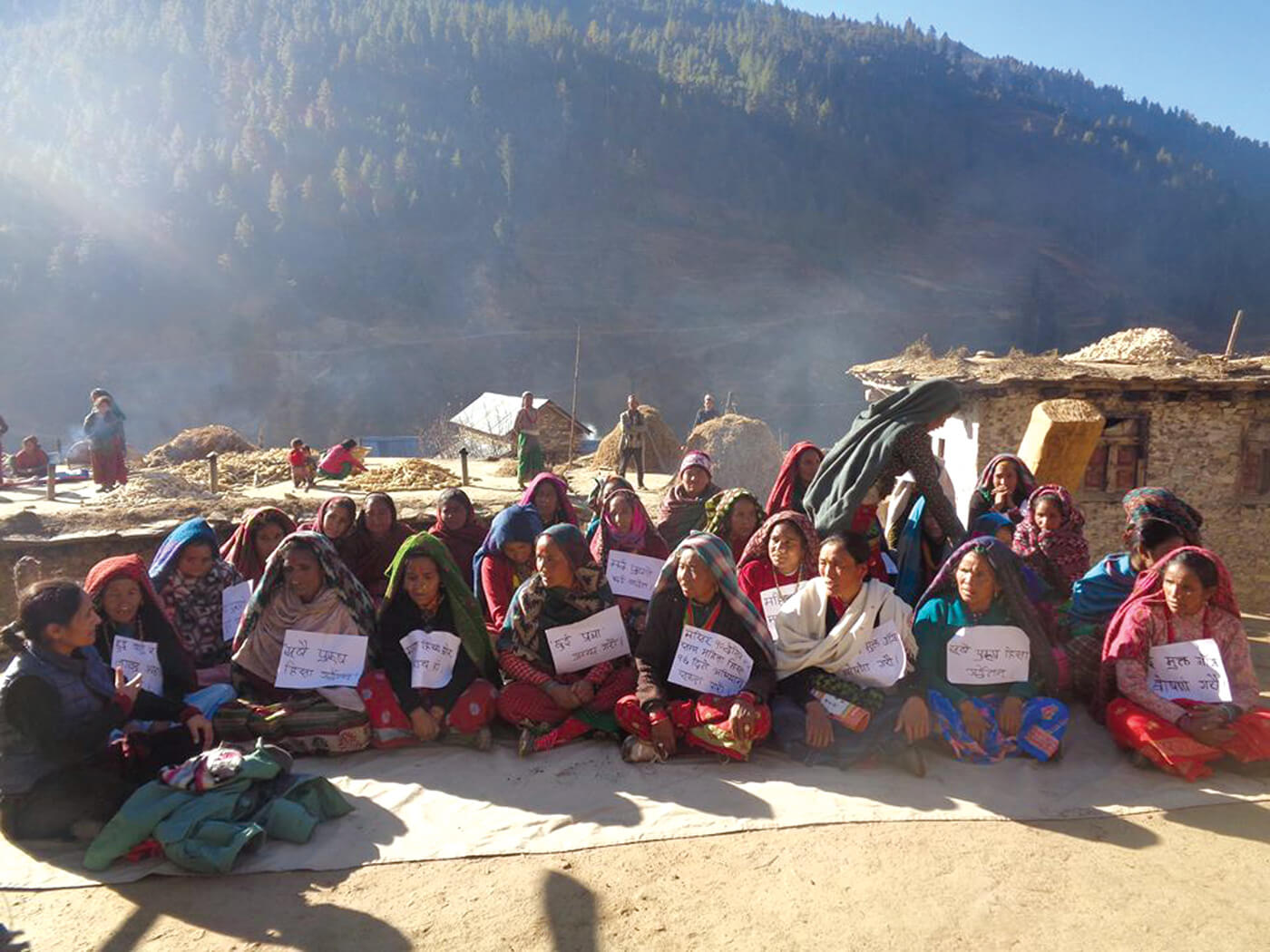Communicating to remove menstrual taboo
Growing up in Chitwan, Radha Paudel’s father used to tell her stories of faraway Jumla: how it took weeks to walk there, the cold snowy winters, the Tila River on the banks of which were the world’s highest paddy fields. She was fascinated.
Paudel became a nurse and, as luck would have it, was posted to Jumla with a safe motherhood program. The maternal mortality rate in the Karnali at the time was at sub-Saharan levels. The strict patriarchy made it an epicentre for neglected reproductive health problems among women.
Read also:
Nepal’s superwomen beat superstition, Aruna Upreti
That time of the month, Editorial
Nepal’s armed conflict with the Maoists was at its peak, and Jumla suffered several rebel raids. Paudel witnessed the fierce one in Jumla in 2002 in which hundreds, including the CDO, DSP and civilians were killed. She survived by hiding under a bed all night as gunfire and bombs were going off outside.

“It was terrifying, I fainted. Then I asked myself what drove them to take up the gun. I found the answer: the class, caste and gender discrimination in the region,” Paudel recalls.
She wrote a book, Khalangama Hamala (The Attack on Khalanga) that described not just the night of the battle but the harsh condition of life for the people of Jumla. The book was awarded the Madan Puraskar in 2013 and brought the plight of the Karnali to national attention.
After a career as nurse and writer, Paudel is now a full-time activist trying to address practices like menstruation restriction on women, which symbolise entrenched gender inequality not just in Jumla, but all over Nepal.

Paudel is back with a second book Pavitra Ragat (Pure Blood), and like her first one this book also deals with blood-letting — only this time it is about the discrimination and taboos women have to face during their periods.
The story began in Paudel’s own childhood, and she writes about how her mother and sisters were made to stay away from the kitchen and temples during menstruation. She had seen girls who menstruated for the first time isolated for three weeks, so when it was her turn Radha ran away from home to her sister’s place.

The book is searing in its honesty, and the practical difficulties Nepali women face during adolescence: not finding enough rags to soak up the blood, always worrying if the blood is leaking through clothes, and asking classmates in school if her skirt is stained, not drinking water so that she didn’t have to go to toilet and risk losing her rag…
As a nurse, Paudel conducted research on menstrual practices and found that many rural women in Nepal did not even know about panties and pads, they bled freely all day, and in many households women took turns to use the same rags. The book is graphic, and not for the faint-hearted reader as it describes the monthly reality for many Nepali women.
When Paudel got her first job, she proudly bought herself proper panties and new, clean cloth to use during menstruation. But, she realised the situation had not changed for many of her fellow-women in Jumla.
Read also: Removing menstrual shame, Clara Hare-Grogg
Periods of banishment, Subeksha Poudel
Today, Poudel is not just spreading awareness but manufacturing biodegradable sanitary pads at a factory in Chitwan, and training young women about how to use these washable pads that do not leak.
Paudel explains why it is important de-glamourise modern sanitary napkins: they are made of synthetic materials and take up to 1,000 years to degrade. Much of the plastic waste dumped by the trails in Nepal are made of discarded sanitary pads.
Besides making an environmental statement, Paudel also wants to promote dignified menstruation and remove the taboo surrounding menstrual ostracisation, the practice of chhaupadi in which women in western Nepal are banished to the cow shed once a month.
“Menstrual isolation is a human right violation, it isolates women by barring them from kitchens, water sources, temples, schools, and homes,” says Paudel. “This means women are treated like second class citizens, or not even human.”

Paudel is determined to also change the image of Karnali as being a backward, illiterate and primitive region. For instance, Nepal’s 2018 Criminal Code prohibits the practice of banishing women to chhaupadi huts during menstruation or childbirth, but does not address more general menstrual restrictions practiced all over Nepal. Limiting the crime of isolating women to chhaupadi unfairly points the finger at only western Nepal.
Women dying of suffocation or snake bites in menstrual sheds make headlines, but not the everyday humiliation women everywhere are subjected to. Paudel says the ceremonial demolition of chhaupadi huts is misdirected. “Even if you replace the huts with a 5-star hotel, that is still discrimination,” she says.
Menstrual shaming exists all over the world, not just in Nepal. Just this month, Unicode approved a droplet of blood as an emoji to symbolise menstruation. Plan International lobbied for the emoji because its poll found that nearly half the girls and women in the UK between 14-21 were embarrassed about their periods.
Across the world, women use code words when they refer to their periods, and Nepal is no different. Paudel lists some of them: chhui, chhau, nachhune, para sarne, all describing the isolation and stigma women face.
Radha Paudel now wants to go beyond physical aspects of menstrual ostracisation to psycho-social and religious beliefs that make many women themselves firm believers in the taboos. Part of the reason she wrote the book is to demystify menstruation so that students, families, men and women can talk about it openly.
Read also:
Pad Power, Ziyu Lin
Stereotyping women as victims, Radha Adhikari and Jeevan Sharma




